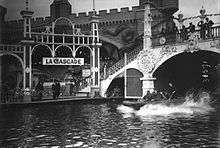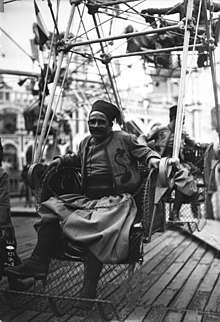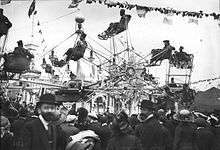Magic-City
Magic-City was an amusement park near Pont de l'Alma, two blocks east of the Eiffel Tower, in Paris from 1900 to 1934.[1][2][3]
A large dance hall at 188 rue de l'Université in Paris was located in Magic-City. The venue was known for its "drag balls."
The emblematic event of homosexual life in Paris in the inter-war years was a series of masked balls held annually during Carnival on Mardi Gras (Shrove Tuesday) and Mi-Carême (Mid-Lent) at Magic-City Dancing, an immense dance-hall on the Rue de l'Universite, near the Eiffel Tower. ... Between 1922 and 1939, thousands of men, most costumed and many in extravagant female drag, attended the balls at Magic-City every year. 'On this night,' wrote a journalist in 1931, 'all of Sodom's grandsons scattered throughout the world...seem to have rebuilt their accursed city for an evening. The presence of so many of their kind makes them forget their abnormality.' Gyula Brassaï, whose photographs have immortalized these fabulous balls, described the 'immense, warm, impulsive fraternity' at Magic-City:
The cream of Parisian inverts was to meet there, without distinction as to class, race or age. And every type came, faggots, cruisers, chickens, old queens, famous antique dealers and young butcher boys, hairdressers and elevator boys, well-known dress designers and drag queens...[4]
It was closed by the authorities on February 6, 1934,[5] and in 1942 the building was bought by the government and turned over to Paris-Télévision, which began broadcasting there in 1943.[6]
Gallery
 La Cascade, Shoot the Chute.
La Cascade, Shoot the Chute. Algerian tirailleur (soldier) at Magic City.
Algerian tirailleur (soldier) at Magic City. La Cascade, 1913.
La Cascade, 1913. Ferris wheel, 1913.
Ferris wheel, 1913.
Notes
- Magic City - Paris 7e Constructions détruites
- Magic-City
- L'encyclopédie du Tango - Magic City
- Higgs, David, Queer Sites: Gay Urban Histories Since 1600, Routledge, 1999, p. 27.
- Tamagne, Florence, A history of homosexuality in Europe, Algora Publishing, 2004, p. 51.
- matelevision.com, "Quelques dates," http://www.matelevision.com/date1.htm.